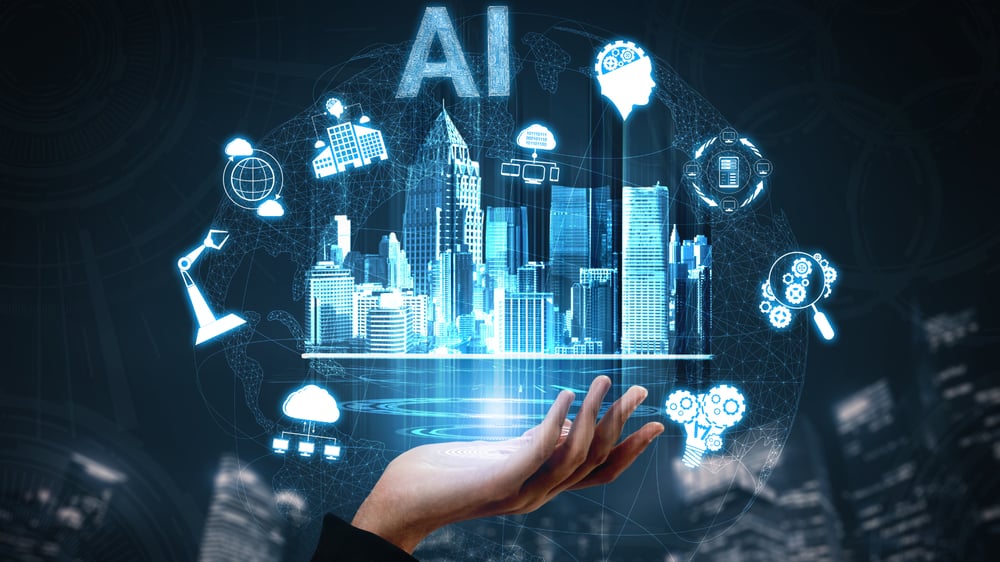In an unexpected turn of events, the conventional narrative of technological advancement has been upended. Instead of following the conventional digital era, it's Artificial Intelligence (AI) that has surprisingly secured its place as the torchbearer of this evolution. With an estimated market growth of $407 billion by 2027 and luminaries like Microsoft and Google investing heavily in AI's potential, it's clear we're on the precipice of an AI revolution.
Yet, amidst the excited chatter and speculation, one question continues to echo in boardrooms across the globe: how can AI truly transform the way businesses operate and grow?
This article aims to unravel that enigma. We delve into three key realms where AI has demonstrated immense promise:
- corporate learning and development
- productivity enhancement
- the simplification of complex scheduling.
We will explore how businesses can harness the transformative power of AI, shedding light on AI's potential to drive efficiency, stimulate creativity, and revamp the way we approach learning and development.
1. Re-imagining corporate learning and development
In the realm of corporate L&D, AI is emerging as a powerful ally: it can optimize the creation, distribution, and analysis of corporate training content, completely transforming the way businesses educate their employees and, ultimately, how they grow.
One of the key areas where AI shines is the personalization of training content. AI algorithms can analyze data related to an employee's past performance, skill level, and pace of learning, and use it to tailor training modules to the unique needs and abilities of each employee.
This ensures that the "one-size-fits-all" approach to learning, which often leaves some learners behind, is replaced with a much more effective, personalized learning path. Such an approach has been shown to greatly improve content retention and overall comprehension.
Moreover, AI tools can provide powerful data analysis, which is a crucial component in understanding the effectiveness of any training program. They can:
- Track an employee's progress over time
- Identify areas of struggle
- Suggest modifications to the training content to better address these challenges.
Providing such targeted, individual feedback would be incredibly time-consuming and challenging for human instructors to handle for each learner, but it's a task AI can handle efficiently.
AI-powered platforms can also offer adaptive learning paths and adjust in real time based on the learner's performance, — ensuring that the difficulty level of the training is always just right. This approach eliminates the risk of learners feeling overwhelmed or bored due to training content that is either too challenging or too easy.
Furthermore, AI-powered tools can be blended with technology such as virtual reality (VR) to simulate real-life scenarios, providing employees with an opportunity to learn in a safe and controlled environment. This is especially valuable for training in high-risk industries where real-world mistakes can have serious consequences.
2. Enhance productivity
AI’s impact is not limited to transforming corporate learning: it has a profound effect on enhancing productivity across a myriad of business operations. From the automation of mundane tasks to refining communication processes and even fostering an environment of creativity, the potential of AI seems boundless.
One of the most impactful capabilities of AI is its proficiency in automating repetitive tasks. Every business has administrative tasks that, while necessary, can eat up considerable time in an employee's workday. AI excels in these areas.
For instance, AI-powered tools can automate processes such as data entry and analysis, management of schedules, and the sorting and organization of emails — liberating employees to concentrate on more intricate, value-adding tasks. By taking over these routine chores, AI doesn’t only escalate efficiency — it also mitigates the risk of human error, leading to heightened accuracy and quality in work outputs.
AI-driven communication tools can streamline processes, diminish response times, and foster effective information sharing. For instance, AI chatbots can handle routine customer inquiries, allowing customer service teams to address more complex issues. Additionally, AI can analyze communication patterns, providing insights to augment team collaboration and reduce miscommunication.
The power of AI extends beyond automation and communication enhancement. Interestingly, AI can serve as a powerful catalyst for fostering creativity within organizations. AI systems can analyze colossal amounts of data, identifying patterns or correlations that might not be readily perceptible to the human eye. Such insights can ignite new ideas, fueling innovation.
3. Simplify the complexity of scheduling
Any business, regardless of size or industry, can relate to the complexity of scheduling. From project timelines to workforce rostering and arranging learning sessions, the orchestration of all these moving parts can be a challenge. Thankfully, we have another key area where AI comes to the rescue: optimizing and automating scheduling processes.
Consider project management, an area fraught with deadlines, milestones, and dependencies. Project scheduling is often a time-consuming process that requires constant monitoring and adjusting. Enter AI-powered project management tools. These intelligent platforms can predict project timelines based on historical data, adjust schedules in response to changes, and even forecast potential roadblocks. This not only saves valuable time but also increases the likelihood of project success.
Additionally, AI-powered scheduling tools are capable of revolutionizing workforce rostering. These intelligent systems can automate the process of creating optimal rosters that not only meet business demands but also take into account employee preferences. By doing so, AI can help improve employee satisfaction and productivity, which, in turn, contributes to the overall efficiency of the business.
But the power of AI in scheduling goes beyond just rostering: a work calendar app can automate the scheduling process, taking into account various factors such as shift preferences, skill sets, and availability. They can also adapt to changes in real time, and adjust to the schedule as needed.
Consider the multinational retailer UNTUCKit which faced substantial scheduling and payroll difficulties across its 88 stores due to a manual, error-prone system. Upon shifting to an AI-based solution, UNTUCKit automated and streamlined scheduling processes. This smart system generated efficient schedules aligned with business demands and employee preferences, improving employee engagement and team communication.
Thanks to AI, the system dynamically adjusted to real-time changes considering shift preferences, skills, and availability. This cut scheduling time by 50% across 45 stores, freeing managers to focus on customer engagement and driving sales.
Parting thoughts
Harnessing the power of AI is not about fostering an era of human redundancy, but rather about enabling an era of human potential, creativity, and innovation. In this new world, AI stands as our ally, promising to elevate businesses to new heights of efficiency, productivity, and growth.
Whether it's revolutionizing corporate learning, enhancing productivity, or simplifying complex scheduling, AI offers an array of promising solutions that will fundamentally reshape how businesses operate and grow.
Now, it's your turn to join the AI revolution. Are you ready to transform your business?
 Rob Press, Deputy
Rob Press, Deputy
Rob is a content marketing manager at Deputy, a robust scheduling software that can be used to manage your workforce in a wide variety of different industries. Aside from helping businesses reach operational efficiency, he keeps up to date with the latest trends in SaaS, B2B, and technology in general.






